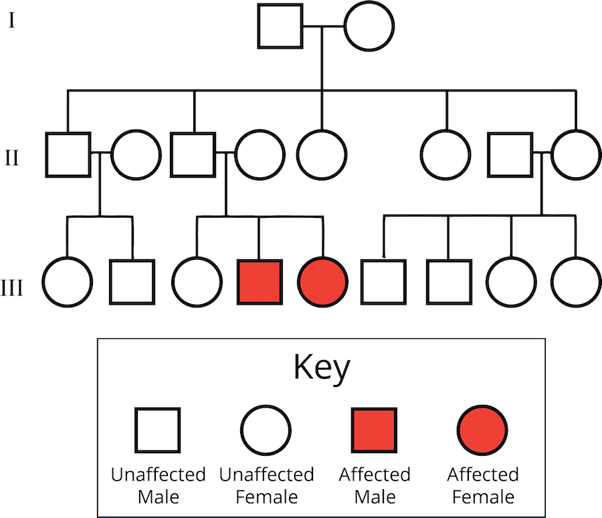
What is genetic counseling like? Is genetic counseling advisable, since my children are deaf?
February 19, 2010

- Related Topics:
- Medical genetics,
- Editor's choice,
- Genetic testing,
- Career pathways
A curious Tech Museum visitor asks:
"Two of my children are profoundly deaf (my oldest child is not but he had a different father). My husband and I haven’t yet gotten genetic testing done. How will this deafness affect our children’s’ children? What are the chances of their children being deaf? I’m assuming it would be advisable for their sakes to do testing? Genetic counseling?"
This is a really hard question to answer. The causes of hearing loss are complicated, especially for prelingual deafness. This is the form you describe where someone is deaf before they learn to speak.
There are many genetic and non-genetic ways to end up unable to hear. There are also many different ways to end up with genetic deafness. It can be very difficult to figure out why someone is deaf and what the chances are that his or her children will be deaf too. This is where a pediatric geneticist and genetic counselor can come in handy.
These two can help in lots of different ways. They can help to figure out how deafness might run in your family. And suggest some genetic tests that might help to clarify this and figure out the chances that the deafness will be passed down.
For some conditions, your children could have up to a 50% chance that their children will also be deaf; for other conditions the chances are pretty close to zero. But the only way to tell is to identify the cause of the deafness.
However, even a genetic counselor and lots of genetic tests may not give a solid answer or guidance. Genetic testing may not be able to pinpoint why your children are deaf. Nor how likely their kids are to be deaf as well.
What I'll do for the rest of the answer is focus on what a visit to the genetic counselor might be like. As we go through it, I'll go over some of the many ways that people can be born with prelingual deafness. And how it can be passed down.
Visit to the Genetic Counselor's Office
I like to think of genetic counselors as members of a genetic investigation team. The team also includes doctors that have special training in genetics called medical geneticists. Together, the two use their tools to find clues or evidence that might help answer your questions.
Tool #1: Personal & Medical history
The personal history, and some of the medical history, comes from you, dad, and the children. You probably know when and how your children's deafness was found. You may also know about their development and doctor's visits and whether they have any other medical problems or subtle differences*. These details may be related to the cause of their deafness.
All this information is important in helping to figure out whether the deafness is even genetic. See, about half of cases of deafness aren't. In these cases, deafness is caused by infections, injuries, or differences in the structure of the ear.
The other half of deafness cases are due to genetics. But that doesn't mean that there is some obvious genetic test that can be given. There are lots of different genetic ways to end up with hearing problems.
This is because lots of different genes are involved in hearing. Which means there are many possible genes that, when not working properly, can cause deafness.
*Of course, you're not expected to remember every detail about medical tests and results. This is why medical records come in handy. They have most of the medical details.

Tool #2: Family history
Believe it or not, your family history is one of the most useful tools in a genetic counselor's arsenal. That's because it can let genetic counselors know if and how the deafness is being passed down in the family.
A genetic counselor will draw your family tree. This type of family tree is called a pedigree, and may look something like this:

They use the pedigree to see if there are any patterns. Is there anyone else in the family with the same symptoms as your children? You may also be asked questions that don't seem to make much sense at first, but they help uncover more clues.
The patterns they see can help them figure out what kind of deafness your children might have and its inheritance pattern. The inheritance pattern describes how deafness is being passed down in your family.
Inheritance patterns that may be seen in your family history. Deafness may be passed directly from parent to child in multiple generations. This is known as a dominant inheritance pattern. It often means that each child of a parent who has this type of deafness has a 50-50 shot of ending up deaf too. (Click here to learn more about dominant traits.)
Deafness may also happen even though neither parent is deaf or hard of hearing. There are at least a couple of possibilities here.
One is called a recessive inheritance pattern. In this case, both parents carry a hidden gene version that can lead to deafness. If both parents happen to pass that version to their child, then that child will most likely be deaf. In this case, each child has a 1 in 4 chance of getting both "deafness" gene versions and so most likely ending up deaf. (Click here to learn more about recessive traits.)
The second is a little more complicated and is called an X-linked inheritance pattern. Here they look to see if mostly males get the disease. A child's chances of ending up deaf depend on whether they are a boy or a girl. (Click here to learn more about X-linked traits.)
There are other patterns that are even more complicated. Your genetic counselor will explain any pattern that is seen. However, there is also a chance that there is no clear pattern. So, more investigative tools are used.
Tool #3: Physical exam
A medical geneticist will examine your children from head to toe, like a lot of doctors do. But medical geneticists have special skills. They pay special attention to small unusual features. If they find them, they try to see if they fit into a specific pattern they can recognize.
Now unusual doesn't mean bad, it just means different. A lot of us have unusual features that aren't harmful and are part of who we are.
When there is a feature like deafness, it is important to pay attention to these other differences because they may be related to the cause of the deafness. When there are other symptoms, like kidney or skin differences, the deafness is called syndromic. This is because the deafness is part of a bigger syndrome*.
A medical geneticist will look for these types of differences in your children, and maybe even in you and your husband. If he finds them, he may think they fit into a syndrome. If that's the case, the medical geneticist may suggest specific genetic tests.
*If the only symptom is deafness, it is considered non-syndromic. About 70% of genetic deafness is non-syndromic.

Tool#4: Genetic Testing
After all of this, we're finally ready to do genetic testing. Except that a lot of the time, we still don't have enough information to order the right test. In other words, genetic testing isn't possible for all deafness.
For example, it may be that the genetic counselor saw no obvious pattern in the family tree. Without knowing the pattern of inheritance, it is hard to know which test to order.
And sometimes, a DNA difference that leads to deafness isn't passed down. Instead, it just pops up out of nowhere. These cases are called “de novo” and can and do happen. In this case there would be genetic deafness but no family history of it!
But if they can make some reasonable guesses from all of these different tests, then genetic counselors and doctors know what type of testing is available. They can offer testing if it fits your situation. If testing is right for you and your family, they'll explain the process and the results.

Author: Debbie Barragan
When this answer was published in 2010, Debbie was a student in the Stanford MS Program in Human Genetics and Genetic Counseling. Debbie wrote this answer while participating in the Stanford at The Tech program.
 Skip Navigation
Skip Navigation
